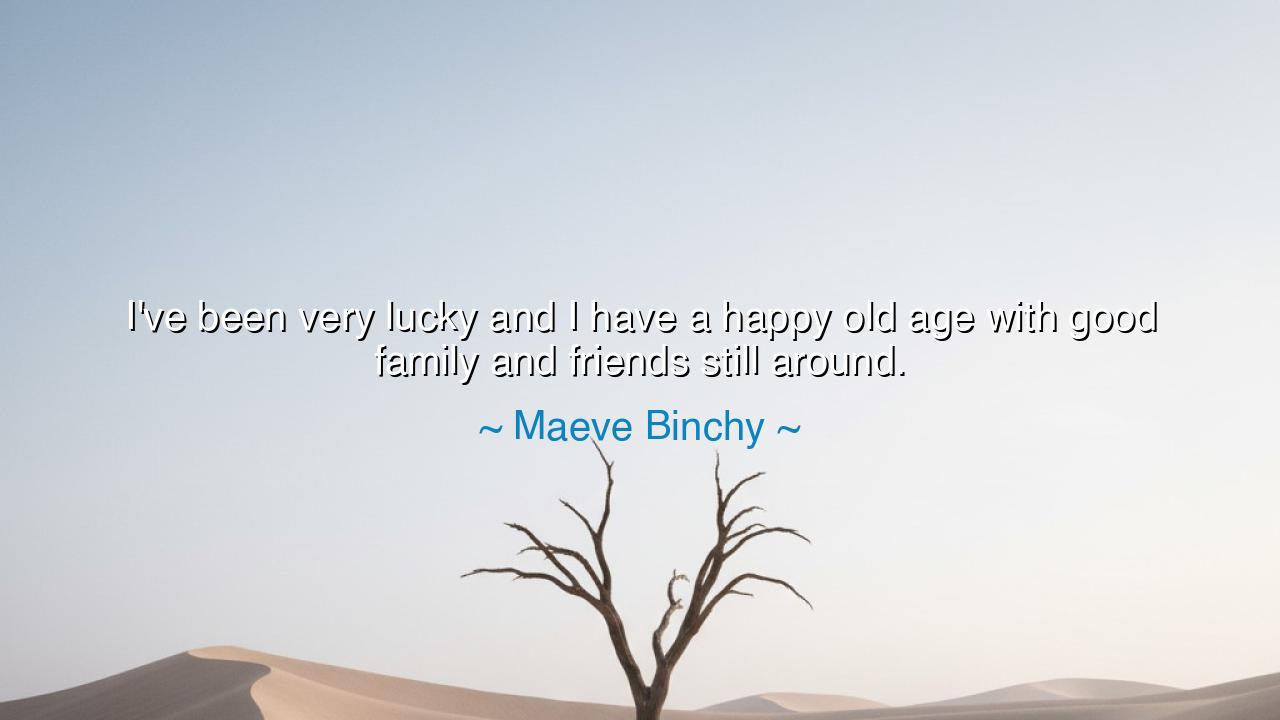
I've been very lucky and I have a happy old age with good family
I've been very lucky and I have a happy old age with good family and friends still around.






In the soft twilight of her life, the beloved storyteller Maeve Binchy once said, “I’ve been very lucky and I have a happy old age with good family and friends still around.” These are humble words, yet within them rests a treasure of ancient truth — that the measure of a life is not in its possessions, nor in its triumphs of ambition, but in the quiet radiance of love, gratitude, and companionship. In a world that worships speed and novelty, Binchy reminds us of the deeper, slower joys — those that come not from conquest, but from connection. Her statement is not merely reflection; it is benediction, a blessing spoken to those who will one day grow old and wish to do so with peace in their hearts.
To say one is lucky is to acknowledge that much of life is grace. For all our striving and planning, the most precious things cannot be earned — they are given: a kind word, a faithful friend, a hand that stays when the world turns away. Binchy’s words breathe with humility, for she knows that fortune alone does not create happiness; rather, it is our openness to gratitude that transforms circumstance into joy. The happy old age she speaks of is not an accident — it is the harvest of a life lived with gentleness and care, of relationships tended like a garden through every season.
Consider the story of Cicero, the Roman philosopher who, in his essay On Old Age, wrote that the later years are not a burden if one’s conscience is clear and one’s friendships are true. He said that the joy of aging comes to those who have planted seeds of kindness throughout life, for in old age, those seeds bloom as memories and companionship. Cicero did not fear the passing of time; he embraced it as a deepening of the spirit. So too did Binchy, whose writing always circled back to the beauty of ordinary people — the warmth of shared meals, the strength of enduring friendships, the laughter that echoes in familiar rooms.
Good family and friends, she says — and in that simple phrase lies the heart of all wisdom. For what is success if not shared? What is longevity if not accompanied by love? The ancients spoke of the golden mean, a life of balance and virtue between excess and deficiency. Binchy’s life, filled with stories of humanity and humor, was such a life — one grounded in kindness and sustained by relationships that gave meaning to her years. She teaches us that the truest wealth is measured not in what we hold, but in who holds us.
Yet let us not mistake her happiness for ease. To reach a happy old age requires effort — not in the pursuit of riches, but in the discipline of compassion. It means forgiving quickly, loving deeply, listening often. It means choosing connection over pride, and laughter over bitterness. In a time when many feel isolated despite endless means of communication, Binchy’s words are a lamp in the dark. She reminds us that we build the future of our hearts through the small choices we make today — every kindness extended, every bond nurtured, every wound forgiven.
Her luck, then, is the kind that is earned through tenderness. It is the reward of one who cherished the ordinary as sacred. She did not chase youth, but embraced time as a friend. In this, she stands with other wise souls of history — Leo Tolstoy, who found serenity in simplicity, or Jane Austen, who found eternity in the quiet depths of family life. They, like Binchy, knew that meaning does not diminish with age; it ripens.
So, O seeker of wisdom, let her words be your compass: cultivate relationships as your greatest art. Do not rush through your days as though they are stepping-stones to something greater — for this, now, is life. Cherish your loved ones as the true measure of success. Practice gratitude daily, for it is gratitude that turns the ordinary into the miraculous. And when you too reach your later years, may you look around and say, as Maeve Binchy did, with calm joy and quiet wonder: “I have been very lucky.”
Thus, the teaching endures: happiness in old age is not found — it is built. Build it now, through love that forgives, through friendship that lasts, and through a heart that remains grateful for every breath. For in the end, the richest legacy is not fame, but peace — and the laughter of good family and friends still around.






AAdministratorAdministrator
Welcome, honored guests. Please leave a comment, we will respond soon